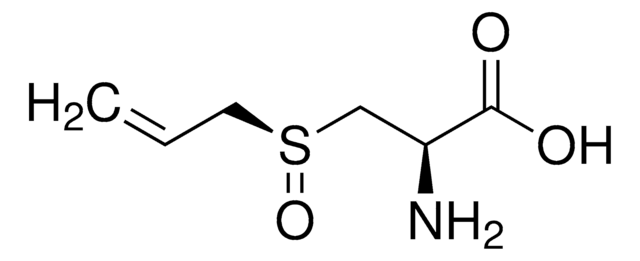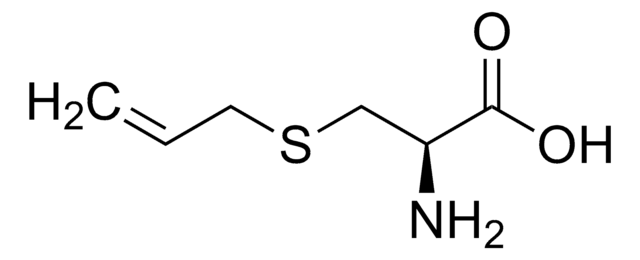74264
(±)-L-Alliin
≥90% (HPLC)
Synonyme(s) :
ACSO, SAC, S-Allyl-L-cysteine sulfoxide
About This Item
Produits recommandés
Nom du produit
(±)-L-Alliin, ≥90% (HPLC)
Essai
≥90% (HPLC)
Forme
powder or crystals
Couleur
white to faint beige
Température de stockage
−20°C
Chaîne SMILES
N[C@@H](CS(=O)CC=C)C(O)=O
InChI
1S/C6H11NO3S/c1-2-3-11(10)4-5(7)6(8)9/h2,5H,1,3-4,7H2,(H,8,9)/t5-,11?/m0/s1
Clé InChI
XUHLIQGRKRUKPH-ITZCMCNPSA-N
Vous recherchez des produits similaires ? Visite Guide de comparaison des produits
Catégories apparentées
Description générale
Application
Actions biochimiques/physiologiques
Conditionnement
Mention d'avertissement
Warning
Mentions de danger
Conseils de prudence
Classification des risques
Eye Irrit. 2 - Skin Irrit. 2 - STOT SE 3
Organes cibles
Respiratory system
Code de la classe de stockage
11 - Combustible Solids
Classe de danger pour l'eau (WGK)
WGK 3
Point d'éclair (°F)
Not applicable
Point d'éclair (°C)
Not applicable
Équipement de protection individuelle
dust mask type N95 (US), Eyeshields, Gloves
Faites votre choix parmi les versions les plus récentes :
Déjà en possession de ce produit ?
Retrouvez la documentation relative aux produits que vous avez récemment achetés dans la Bibliothèque de documents.
Les clients ont également consulté
Notre équipe de scientifiques dispose d'une expérience dans tous les secteurs de la recherche, notamment en sciences de la vie, science des matériaux, synthèse chimique, chromatographie, analyse et dans de nombreux autres domaines..
Contacter notre Service technique












